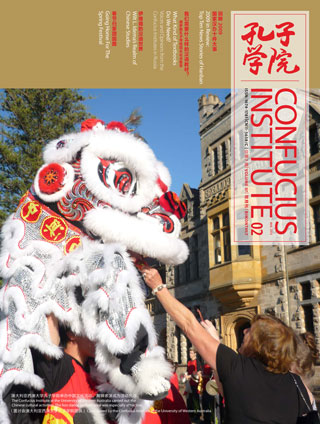

Sheng Mengdan: “Life is like a marathon”
Sheng Mengdan (Australia): “Nothing in the world is too difficult if you put your mind to it. Life is longer than a marathon. If a mere marathon could beat me, how would I be able to confront the many obstacles of life in the long run?”
Currently there are over 4,000 Chinese language teachers and volunteers teaching Chinese in Confucius Institutes, primary and secondary schools and universities throughout the world. While spreading Chinese language and culture, these cultural envoys personally experienced exchanges and interactions with different teaching practices and other cultures. The column of Teachers’ Voices is a channel where Chinese language teachers and volunteers can share their teaching experience with each other. There will also be a collection of stories on their unique experiences in foreign lands these cultural envoys can share with our readers.
Sheng Mengdan, Volunteer teacher of Chinese at Geelong Language School, Australia
Since I came to Australia a year ago as a volunteer teacher of Chinese, I have learned a lot. Some of these are shared by all other Chinese-teaching volunteers: enriched teaching experience, improved English skills, deepened understanding of Western culture, etc. In addition to all these, however, I have made a unique achievement: I have changed myself from a lazy girl who hated exercising into a running sportswoman. How did this happen?
As it happens, the school where I teach – Geelong Language School Timbertop Campus – is well known in Australia for its rigorous outdoor training. Each week the students are required to complete 3 training sessions of running in addition to 3 days of hiking training. I had thought that my job would just involve being a good Chinese teaching assistant and that the harsh outdoor training sessions were for students only. It turned out, however, that I was supposed to take part in all school activities.
Before coming to Timbertop, I hardly ever ran. Back in China, exercising for me was limited, literally, to climbing the stairs leading to my dormitory plus occasional shopping trips. I was therefore in a cold sweat when I heard that I, too, was supposed to take part in the running. I finally decided, however, that my petite stature – thus my short legs – and my flatfeet were not to be shortcomings that defy compensatory efforts. Nothing in the world is too difficult if you put your mind to it. Life is longer than a marathon. If a mere marathon could beat me, how would I be able to confront the many obstacles of life in the long run?

“I won’t be a deserter,” I quietly told myself. At first I was almost always – barring accidents – one of the few who lagged behind. Running at Timbertop invariably meant hilly hiking trips. By the end of the term, I had worn out two pairs of running shoes. In the beginning, each and every daunting slope gave me a hard time, with my legs weighing me down as if they had been filled with lead. However, I knew that, as long as I completed each run, my running would surely improve.
“Do not stop or walk,” was the first goal I set for myself. I gave myself additional training in order to strengthen my leg muscles, going through 40 minutes of bike-pedaling at the school gym every time I got back from running. The teachers at the school toldme that this exercise would make my legs stronger, which would then make climbing slopes less of an ordeal. Many such sessions later, I stopped “sighing at the sight of slopes”.
Steadily, my rank among the runners rose. The anxiety and distress that used to precede every running session are now replaced by what actually seems to be some kind of excitement. Running to me is no longer a tiresome activity. In my “fight” against it, I have, in fact, become addicted to it.
A town close to the school recently held a 9,000-meter distance running competition in order to raise money for the hospital there. Participants numbered 5-6 hundred, including all the teachers and students of our school and the town’s residents. It was a huge, bustling crowd that day.
At the sound of the starting gun, everybody dashed forward with all the might they could muster; I was no exception. However, the weather on that day was not very cooperative; temperatures up to 34 degrees made that run a difficult one. After a while, some people switched from running to walking. I ran so hard that my throat felt parched, but that was not enough to stop me from making it to the finish line.
When resting afterwards, I suddenly heard my name called by a teacher behind me who had been tallying the scores. To my surprise, I came out third place in the 18 to 35-year-old women’s group, making the 9,000-meter distance in 42 minutes. When awarding me the prize, the school president joked that I had run all the way from China, upon which the crowd burst into applause. One of the teachers said to me, “You shot past me like a bullet.” Awarding me the medal, the president was so excited he gave me a big hug. Then he said to the students beside him, “Look at this Chinese. She’s great!” That moment, my heart was filled with joy.
To me, life is a long-distance run. People who stop when they cannot bear the fatigue give up too easily. They remain where they are, because they cannot surpass themselves. Like long-distance running, life is full of difficulties. When faced with a difficulty, we should not give up too readily. Through persistence in long-distance running exercise, I have strengthened my will power and gained courage to help me overcome life’s hurdles.
As a volunteer Chinese teacher, my job is not limited to imparting knowledge of the language; it is also my responsibility to propagate Chinese culture and help the world understand China through my own actions. Chinese culture is definitely not just about the Four Great Inventions or the Ten-Thousand-Li Great Wall; it is embodied in every Chinese. “Take note of what a man says, but judge him by his deeds.” Foreign friends form an image of Chinese people by hearing what we say and watching what we do. Over the past year, I have constantly reminded myself to watch my words and deeds and to do my job well.
“Life is longer than a marathon.” My Australian career as a volunteer is coming to an end, yet my career as a runner in the race of life continues…























No hay comentarios:
Publicar un comentario